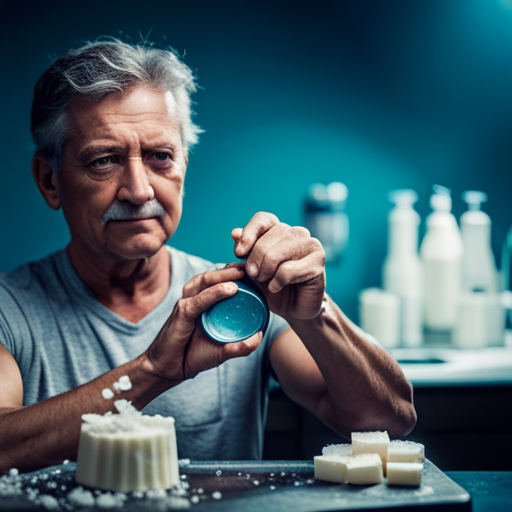Are you tired of struggling to get your laundry clean or feeling like your skin and hair are always dry and dull? If so, you may be dealing with hard water. This common problem affects many households, and it’s caused by an excess of calcium and magnesium ions in your water supply.
Unfortunately, these ions can cause a range of issues that can impact your cleanliness and even your health. When you have hard water, you may notice that soap doesn’t lather as well, leaving you feeling like your skin isn’t getting clean. You may also see the formation of soap scum in your shower or on your dishes, which can be tough to remove.
On top of that, hard water can lead to dry skin and hair, making it difficult to maintain a healthy glow. In this article, we’ll explore the chemical reactions behind these problems and provide solutions to help you combat the challenges of living with hard water.
Key Takeaways
– Hard water contains excess calcium and magnesium ions which can have negative effects on cleanliness and household appliances
– Soft water is better for skin, hair, and appliances, and reduces the need for soap and cleaning products
– Water softeners, boiling water, ion exchange showerheads, and apple cider vinegar can all be used to soften hard water
– While hard water may have some health benefits, soft water is better for maintaining a clean and healthy home.
Effects on Cleaning
If you have hard water, it can decrease the effectiveness of disinfectants and make it more difficult to properly clean surfaces and items. This is because the excess calcium and magnesium ions in hard water disturb the reaction between soap and water, leading to the creation of soap scum that is difficult to clean. The efficiency of soap is also reduced, making it harder to dissolve oil droplets and leaving behind limescale residue.
Furthermore, hard water can have an impact on household appliances as well. The minerals in hard water can build up on the heating elements of appliances like dishwashers, washing machines, and coffee makers, reducing their efficiency and lifespan. Hard water can also leave behind mineral deposits on clothes and dishes, causing damage over time.
It’s important to be aware of the effects of hard water and take steps to mitigate its negative impact on cleaning and household appliances.
Chemical Reactions
You may have noticed that the reason soap doesn’t lather properly in certain situations is due to excess calcium or magnesium ions disturbing the chemical reaction between soap and water. Soap chemistry involves the breakdown of fats and oils into sodium salts and glycerol, which then surround and dissolve oil droplets. However, when hard water minerals like calcium and magnesium are present, they react with the sodium in soap to form calcium stearate scum, which is difficult to clean and reduces soap efficiency.
Understanding the chemical reactions between soap and hard water minerals can help you make informed decisions about your cleaning routine. The following table highlights the key differences between soft water and hard water, and how they affect soap chemistry:
| Soft Water | Hard Water |
|---|---|
| No excess calcium or magnesium ions | Excess calcium or magnesium ions |
| Soap lathers properly | Soap does not lather properly |
| No soap scum or limescale residue | Creates soap scum and limescale residue |
| Better for skin and hair | Dries out hair and makes skin feel less clean |
By using this table, you can identify whether you have hard or soft water and adjust your cleaning routine accordingly. For example, if you have hard water, you may want to use a clarifying shampoo and consider adding apple cider vinegar to reduce the impact of calcium and magnesium ions on your hair and skin.
Solutions and Prevention
To prevent the negative effects of excess minerals in your water, consider using a water softener or boiling your water to reduce the amount of calcium and magnesium ions.
Water softeners use ion exchange to convert hard water into soft water, which is better for skin, hair, and appliances. Soft water also reduces the amount of soap needed for cleaning and can extend the lifespan of appliances.
Boiling water can also soften it and cause hard water minerals to sink to the bottom, so you can use the top portion of the water for cleaning. Other preventive measures for hard water include using an ion exchange showerhead in the bathroom and adding apple cider vinegar to shampoo to decrease calcium and magnesium ions.
Lowering the water temperature can also reduce damage to clothes and dishes. Benefits of soft water include reduced soap scum and limescale residue, better lathering of soap, and cleaner skin and hair.
Remember that while hard water may be better for health, soft water is better for the cleanliness and maintenance of your home.
Conclusion
Now that you understand the effects of hard water on your cleanliness and health, it’s time to take action.
You can start by investing in a water softener, which will remove excess calcium and magnesium ions from your water supply. This will not only improve the efficiency of your soap, but it will also prevent the formation of soap scum and protect your skin and hair.
But if a water softener isn’t an option for you, there are other solutions available. Using apple cider vinegar as a natural rinse for your hair or adding baking soda to your laundry can help combat the effects of hard water.
With these tips and tricks, you can say goodbye to hard water woes and enjoy the benefits of clean, healthy water.




